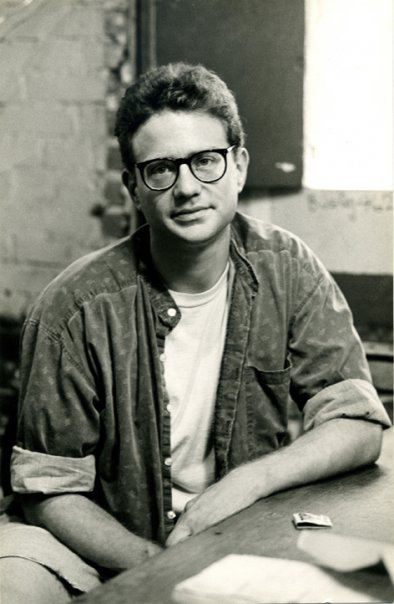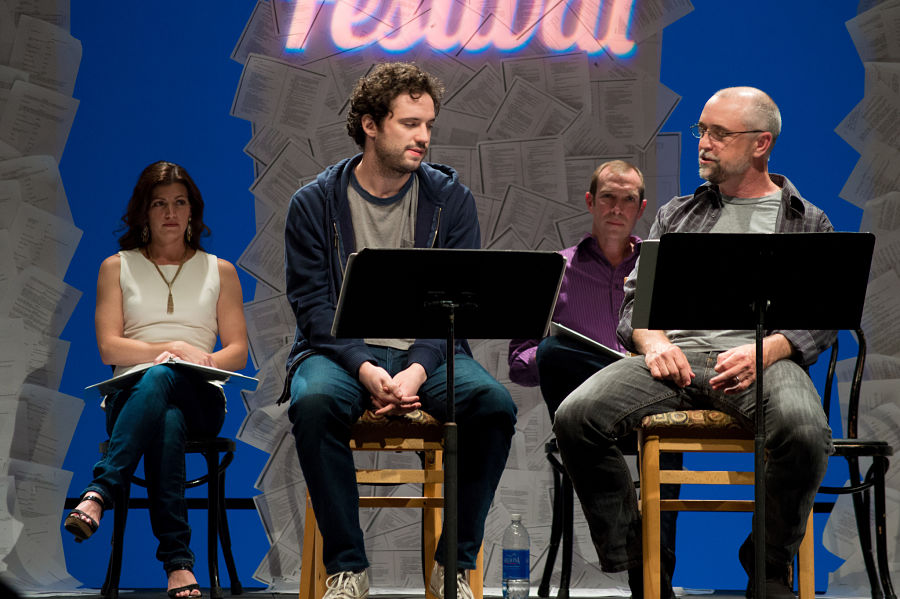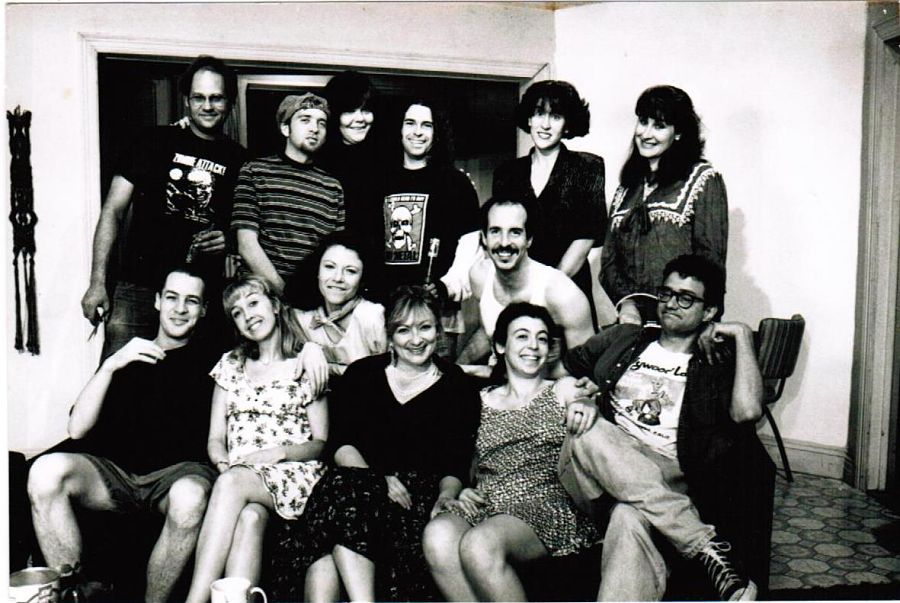Twenty years ago the best theatre in Los Angeles was happening on El Centro Ave., an unprepossessing little residential street just west of the Paramount lot, where Tim Robbins funded the building of a lavish-ish theatre space for his Actors’ Gang, then decamped to New York, leaving the keys with a motley crew of devising auteurs, a Joint Stock Company for the ’90s (Tracy Young, Kirk Ward, Mike Schlitt, Chris Wells, Daniel Parker, Molly Bryant, the Tenacious D guys, so many more).

Southward, closer to Melrose Blvd., on the two stages of the old Circle Theatre (built by an earlier generation of UCLA theatre grads, including Charlie Chaplin’s son Sydney, in the 1940s), Diana Gibson had turned the late Ted Schmitt’s local-playwright-nurturing regime at the Cast Theatre into a de facto showcase for one quiet, bespectacled young playwright from Salinas, Calif., and an ad hoc resident company of actors who starred in all his plays. If you were in L.A. at the time and even remotely culturally aware, you probably heard the name of Justin Tanner; you would have likewise been aware of a long-running late-night show called Zombie Attack! and another perennial hit with the infernally catchy title Pot Mom. These and several other snarkily named plays—Happytime Xmas, Bitter Women, and my favorite, Teen Girl—were quick-witted comedies about downwardly mobile white people that were played straight and fast, like some kind of unholy mashup of Richard Linklater and Howard Hawks (or, to use a more theatrically relevant contrast, Annie Baker and Nicky Silver). LA Times critic Laurie Winer made an apt comparison to Mike Leigh, which captured a bit of the Tanner milieu though not the snap and tickle of his comedy, for which the names Ayckbourn or Molière weren’t far off the mark.
The peak of that period was the year in which Gibson ran eight of Tanner’s plays in rotating rep on the two stages of the Cast. I eagerly lapped them up, along with several cans of cheap brew in the modestly tiki-style “beer garden” that resident set designer Andy Daley erected in a sort of alley next to the smaller theatre. Those plays (and a number of subsequent ones, especially the moving Heartbreak Help) stuck around long enough to teach me an invaluable lesson about the irreducible evanescence of theatre, particularly in a town like Los Angeles, where the common if insidious urge to imagine a bigger and brighter future for small, beautiful pieces of art you happen to find in out-of-the-way places is compounded by the move-it-or-lose-it value system of the film business, in which small doesn’t count (and small theatre? Meh). It struck me powerfully at the time: No, actually, the communion of theatre is an end in itself, to be cherished as it happens, and that rather than thinking, “This is so great, it ought to go somewhere,” my job as a critic and witness and advocate of work as great as those collected plays was simply to say, “This is so great because it’s right here, right now; this is happening, and it’s glorious.”

But that’s not the end of the story. Theatre is ephemeral, but artists wake up the next day with the same need to create (and eat). The unrepeatable moments in time that constitute the best theatre experiences may not need to go somewhere else, to a larger stage or another form, to realize their full potential—but the artists who create them do need to go somewhere else, even if that just means the next project, and to keep creating. And that, I fear, is where the American theatre, and particularly L.A. theatre, too often lets them down. Tanner is now writing the occasional TV episode and theatrical project, and singing in a rock band with his brilliant boyfriend Kristian Hoffman; he told me last week, “I simply don’t understand what happened. I fully expected to be published and produced all over the world by now.” Though Pot Mom eventually had a reportedly underwhelming production at Steppenwolf (due to the championing of Laurie Metcalf, who’s appeared in many of Tanner’s plays), Tanner said that he frequently gets requests for scripts and readings but that productions never come to fruition.
Meanwhile Laurel Green, the willowy blonde comic genius who was Tanner’s main muse—imagine, if you can, a cross between Georgia Engel and Hope Davis—is now living in Nashville, mostly not acting but not giving up the dream entirely, either. Her drought will end next week, in fact: On Tuesday, Sept. 22, she’ll appear in a self-produced reading of Pot Mom at a tiny upstairs theatre over a Nashville coffee place called Bongo Java. Where initially Green played one of the bratty daughters of the titular pothead matriarch, Patty, she’ll now play Patty’s compromised friend Michelle. (If the premise of Pot Mom sounds a bit like a certain Showtime series, it’s probably not coincidental, though Tanner’s influence has never been acknowledged.)
“I’m a little nervous playing a regular adult,” Green confessed last week. Indeed, she was the original Teen Girl, a role she played well into her 20s (and a little beyond? I haven’t done the math). But revisiting Pot Mom’s domestic squabbles and cutting one-liners, she said, “I’ve been giggling and laughing and remembering how the actors said certain lines. All the old voices are coming back.”
Green credited two Nashvilleans with inspiring this reading revival: Lauren Braddock, an actor and singer/songwriter who’ll play the title role of Pot Mom, and whom Laurel counts as her best friend since she and her husband, actor and drummer Matt North, moved there in 2010; and Matthew Rosenbaum, a young actor she saw in a reading of a Donald Margulies play at Nashville Rep’s Ingram New Works festival last spring.

“I loved Margulies’s clipped, naturalistic style, and the overlapping dialogue,” said Green. It reminded her of Tanner’s famously choral argument scenes, and Rosenbaum, playing an aimless young man with a flawless deadpan, seemed like a perfect fit for the un-showy Tanner style. Though he’s got a full plate with Shakespeare, children’s theatre, and Nash Rep’s upcoming Rosencrantz and Guildenstern Are Dead, Rosenbaum jumped enthusiastically into the role of Pot Mom‘s Troy, Patty’s smarmy, smart-ass son, a role created by the matter-of-factly sneering French Stewart.
Will a beachhead in Music City—where Green and Braddock hope to stage more Tanner readings if next week’s goes well—help turn the tide for the playwright’s national reputation? Stranger things have happened. Though Tanner told me he feels like he’s “over theatre” and prefers the immediacy of performing live music, he went on to enumerate theatrical projects he’s working on (including a one-woman show for the peerless Mary Scheer) and concluded, “I do think I will have a second wind, and that I will take another stab at being a viable American playwright. I still have a fantastic acting company and producers willing to put up the money. I just need to be inspired again.”
His lips to God’s ears.


